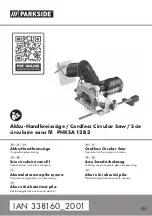
Caution!Danger of crushing!
Always keep a firm grip on the machine
with your free hand when adjusting plunge cuts.
Never position your fingers behind or below the
saw blade.
Procedure
► Adjusting cutting depth, see section
► Press lever [8-1] down.
Sawing unit swivels upwards to plunge-cut po
sition.
► Hold retractor lever [8-2] downwards as far
as stop.
Pendulum guard [8-4] opens and the saw blade
is exposed.
► Position saw on workpiece and position
against a stop (kickback stop).
► Switch on saw.
► Slowly press down saw to the set cutting
depth until the saw engages, release re
tractor lever [8-2] and push forward in cut
ting direction [8-9].
The notch [8-3] indicates the absolute rear cut
ting point of the saw blade (diameter 160 mm)
when using the saw at maximum cutting depth
with the guide rail.
8.4
Speed setting for each material
Material
Speed range
Solid wood (hard, soft)
Chipboard and hardboard
Laminated wood, blockboard, veneered and laminated panels
6
3–6
6
Plastics, fibre-reinforced plastics (FRP), paper and mesh
Acrylic glass
3–5
4–5
Gypsum and cement-bonded fibreboard
1–3
Aluminium panels and profiles up to 15 mm
4–6
9
Service and maintenance
WARNING
Risk of injury, electric shock
► Always pull the mains plug from the socket
before performing any servicing and main
tenance work.
► All maintenance and repair work which re
quires the housing to be opened should al
ways be carried out by an authorised serv
ice workshop.
Customer service and repairs must
only be carried out by the manufac
turer or service workshops. Find the
nearest address at:
Always use original Festool spare
parts. Order no. at:
EKAT
1
2
3
5
4
Cleaning the machine regularly, espe
cially the adjusting devices and guides, is
an important safety factor.
Observe the following instructions:
► Damaged safety devices and parts, such as
a faulty lever for changing tools [1-3], must
be properly repaired or replaced in a recog
nised specialist workshop, unless otherwise
indicated in the operating manual.
► To ensure constant air circulation, always
keep the cooling air openings in the housing
clean and free of blockages.
► Use an extractor on all openings in order to
remove wood chips and splinters from the
power tool. Never open the protective lid .
► The pendulum guard must always be able to
move freely and close independently. Al
ways keep the area around the pendulum
guard clean. Clear from dust and chippings
by blowing out with compressed air or using
a brush.
► When working with plaster- and cement-
bonded fibreboards, clean the tool particu
larly thoroughly. Clean the vents of the
power tool and on/off switch using dry, oil-
free compressed air. Otherwise, gypsum
dust deposits may build up inside the power
tool's housing and on the on/off switch and
harden when exposed to humidity. This may
impair the switching mechanism.
English
26
Summary of Contents for 576121
Page 2: ...1 1 1 10 1 12 1 11 1 13 1 15 1 16 1 14 1 9 1 8 1 7 1 1 1 2 1 3 1 4 1 6 1 5 1 ...
Page 3: ...2 3 FS 3 1 ...
Page 4: ...4 0 50 0 50 5 5 6 4 1 4 2 5 1 5 2 5 4 5 5 5 3 5 8 5 7 5 10 5 9 5 11 ...
Page 5: ...7 45 0 6 1 2 6 1 6 2 6 3 7 1 7 2 ...
Page 6: ...8 3 8 1 8 2 8 8 4 FS 8 7 8 5 8 6 8 9 8 8 ...
Page 8: ......
















































